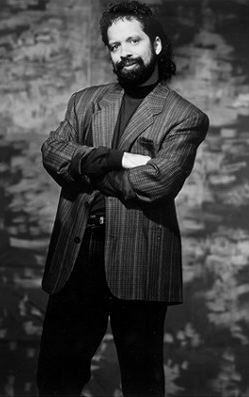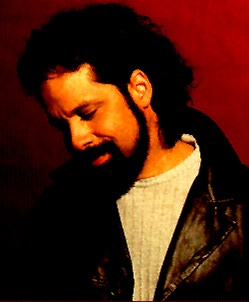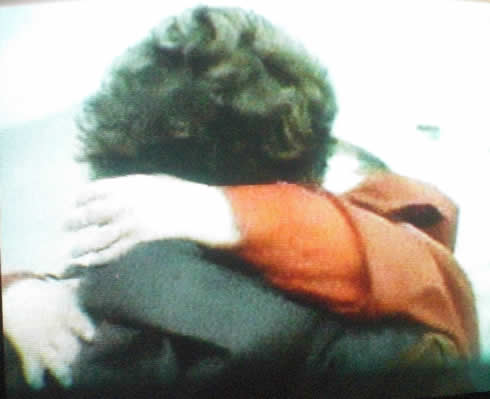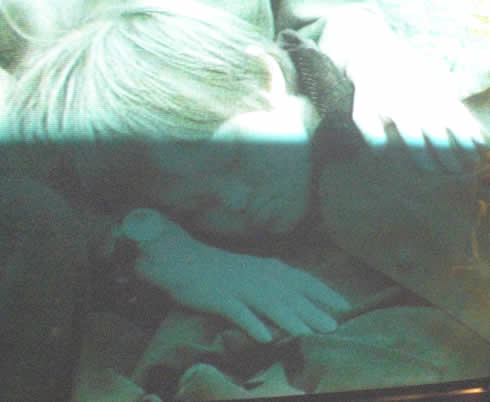| The
Purpose of HEALING - K.I.S.S.
- as stated 12 years ago - was and is
to help me and my potential P E E R s
"to HEAL ourselves into WHOLEness,
and - by extension - all of CREATion!" |
|
I focus my experiencing and awareness on being
"a pioneer of Evolution
in learning to feel":
I let my Body vibrate and my Heart 'womb'
pain, shame, fear, boredom, powerlessness,
so feelings can >heal >guide>fulfill>evolve,
and ~~~ offer ~~~"goldmines"~~~ to us all!!
"I
want you to feel everything, every little thing!"
|
|
K.I.S.S. -
L O G 2
0 0 8
Keep It Simple Sweetheart
| |
1
|
2
|
3
|
4
|
5
|
6
|
7
|
|
|
1
2
3
|
How
Learn
And
|
I
The
Train
|
Heal
Conditions
In
|
Myself
For
Creating
|
Into
Heaven
Those
|
Whole
On
Conditions
|
Self-acceptance
Earth
Daily
|
Click!
|

Then those who see Ha-Shem, will talk
among each other,
and he listens and he
hears
yatakaalamuna allathina
yarau'na-hu ,
va-yusri va-yasma'
Dann die IHN schauen, werden reden miteinander,
und er lauscht und er
hoert
Puis ceux qu'ils voient Ha-Shem, se parlent
l'un a l'autre
il entends,
il ecoute
|
|
Intro
to
k.i.s.s.-l o g + all
dates
~ Library of
7 years ~ HOME
~ contact ~
SEARCH
( of Latin characters only!) my
eldest granddaughter's video-gallery
|
|
|
|
|
Actions:
To the pool
(2) climbing up and down
the Wadi of Compassion
Garden: working watering
Kisslog: healing-creating
TV & Internet: learning
Preparing food. |
Interactions:
SMS
to Efrat +thanks from her

e-mail to Amir, who still wants to interview me for his Bir'am-Bar'am
history |
|
The FOCUS of MY INTENTION
TODAY
Know exactly what you want, communicate clearly what you want,
then get out of the way, live and play, and let happen what
may
9:13
I desire to digest, what I learnt
yesterday and excel in every memory that wants to come up.
I desire, that Meital, my landlady, will heal her feeling of
unworthiness and her defensiveness.
I desire that all my 26 souls - whom I remembered one by one
by age and name when waking up
will grow into self-acceptance and into their greatness for
the sake of the healing of Creation
I desire to enjoy every moment of this Shabbat in the quietness
and solitude of my castle.
|
Finetuning to my Present
On Thursday at about 16:30 I was so angry,
because a power cut-off again stopped not only the computer,
but the UPS, which should keep it open even when there is no
power,
and then I can't even open the computer anymore.
I heard Ofir working and he said, yes it happened to him,
and it might happen again, as long as he is installing the lamps
of the pergola.
He was very concerned and caring about my problem,
advised that I should wait a little and perhaps not work with
the computer at all
until he'll be finished.
He said, this would take about half an hour, but, I know him
and such works,
it took 2 hours.
I used the time to work outside on something I had decided on
just that morning
when I discerned - from the street - how ugly looked the corner
of the house.
In the meanwhile the UPS returned.
I called Eduard, my fantastic technician, for the first time
after 7 months,
since I have the new computer, - but - no answer. Is he still
around???????
Ofir warned me, that the next morning he had "a little
more work" to do.
Yesterday he informed me at 8:30, that he would begin, and it
was no problem,
since I was dedicating my time to TV -"SLEEP" - +
half an hour pool.
When at 12:00 I still saw him working, I approached him and
said:
"How long will this take, Ofir!"
I felt, that it was difficult for him
to say:
"What can I do, Rachel, but it will
take a little more time!"
"But how much, Ofir! So that I at least can organize my
time!"
He said: "At
least an hour!" While leaving
I mumbled, "this means 2 hours".
I also felt then and from then on, that
I had pressured him too much.
And after all, I was mostly watching TV, so it wasn't so "terrible",
that I didn't have the computer to look in or write a sentence
here and there.
This time it took even a little less than an hour and I wondered
what all this meant.
It was close to 8 o'clock on Shabbat Eve,
when the kids walked into my open door, each with a dish in
their hands.
It was so cute!
Of course they spilled out all they wanted to say or ask for
, and would not leave.
But soon enough they were called by their parents,
and since they asked me to bring them home around the street
corner,
I did so, but when I wanted to leave them at the gate,
the parents called me from the new pergula outside the entrance
to their house:
"Come just for a few minutes!"
I was dressed for Shabbat in my old but
pretty dark-red dress, barefoot.
During the 20 meters until I reached them, I saw the moon:
"Look how beautiful the crescent
moon is, when the entire globe can be seen".
"Who has eyes for moon",
said Meital, busy between outside and inside.
I said: "thank
you for the Cuscus dish" and
then I felt prompted to praise Ofir.
"You know, you are really something!"
Meital interrupted - from her poor "Cain"
feeling of unworthiness:
"And what about me, didn't I... am
I not...?"
She laughed, but I knew, she was serious:
"Meital, let me say, what I want
to praise him for, it's something specific".
She went into the house: "No,
please, hear this too, for it's extraordinary."
And I told him the story about the tractoron-issue
in April,
which was so strong, that it became an example which I use to
tell,
when there is an opportunity to teach what it means:
"not to override, not to succumb, but
to make 1+1=3".
"This time it wasn't such a big issue,
but again I discerned,
how you stand up to me, but so gently, that you do not override
me.
I wished I could be like you."
"And you aren't like that?" said Meital.
"Oh no, I so often succumb to people
because I want to please them."
"Perhaps you got used to that!"
"I grew up like that, but in seventy years I could have
learnt it!
Though when my mother didn't want me to go to Israel , I did
go,
and in all big things I did what was right for me,
- and mumbling to myself:
except in a few things and for those
I'll never forgive myself,
thinking of "One
of your family is enough",
and "either me or your mother",
and not thinking of the terrified succumbing
to sexual cajoling 3 times in my life.
"but in small things I still cannot
stand up to myself,
like when I am with Tomer and want to go to bed at eleven
and he says: "Oh no! I want to show you something on TV...!"
When I entered my castle, I knew, why
I had "created" that power-cut-off:
it was necessary for the staging of this interaction with my
landlords!
|
synchronicity
Having been flooded with "sleep"
the entire day,
and having strongly resonated with the sentence
(copy from yesterday, and see, if I can find it somewhere
literally)
[now, on Oct. 29, I don't know
to what sentence I refer here...]
I closed the TV set on 23:30 , and -
since it was Shabbat Eve -
took my cherished little, fat book "Der grosse Boss",
the stories of the Hebrew Bible told as parodies in German.
"Let me find something that
has to do with sleep", I
said,
while opening the book.
And indeed - though I had some stories about sleep in mind-
like Eve's creation from Adam's rib during a deep sleep,
or like Ya'acov
sleeping on a stone
and having that dream of the angels' ladder-
I would never have guessed, what opened itself:
p. 313 from the chapter: "Sammy
lernt Prophet"
"Sammy learns to become a Prophet"
1
Samuel 3
"Eines Nachts
- Samuel hat sich vor der Bundeslade zum Schlafen niedergelegt
- hoert er einen Ruf:
Samuel! Samuel!
Sofort steht er auf und laeuft zu Eli.
Ja, was gibt's, Herr Oberpriester?
Was es gibt? Nichts gibt's.
Du hast getraeumt, mein Junge.
Marsch, zurueck in die Heia!
Kaum hat sich Samuel wieder niedergelegt, hoert er erneut
seinen Namen.
aber auch diesmal will Eli ihn nicht gerufen haben.
Dieses Spielchen wiederholt sich noch ein drittes Mal.
Da raet Eli ihm, sich beim naechsten Anruf mit seinem Namen
zu melden. Vielleicht ist es ein Gespreach vom GROSSEN BOSS
persoenlich!
Frueher hat er mit unsereinem engen Kontakt gehalten.
Der halbblinde Greis hat recht.
Als wieder Samuels Name ertoent und er sich sprechbereit meldet,
hoert er tatsaechlich den GROSSEN BOSS: Hallo, Sammy! Hoer
mir gut zu, denn ich werde Israel fuer deine Karriere programmieren,
indem ich das Haus Eli schlichtweg ausloesche.
Bitte nein, fluestert Samuel verstoert.
Der Eli ist wie ein Vater zu mir.....
In dieser Nacht bekommt Samuel kein Auge zu.....
Extremely pleased with this message
I lay down telling "God":
What if you, for once, would talk to me like that as clearly?
And if not, at least let me, from now on, remember my dreams!
The first time I woke up, I rehearsed my dream and was sure,
I had "got" it.
But already, when I arrived at the loo, I had forgotten it.
The next 3 times I woke up
(now at least I know that it's normal to wake up about 8 times
a night),
I couldn't even rehearse, nor could I do it in the morning.
But that first time, when in bed again, I remembered the scene
on TV,
which was repeated - with progressing - in between the programs:
the funny moderator Katrin Bauernfeind.
And having heard - even in the background - about 4 times
during the day,
that at some hour of her last 24 hours in sleepless solitary
confinement
she was allowed to cook, and that she
- as is the usage in her "Suabian homeland" -
cooked , "Spaetzle", Kaesspaetzle for that matter,
I was even then, and more in the night, stimulated by this
double memory:
the name "Bauernfeind" and the "Spaetzle".
I became so excited by replaying my memories, that I couldn't
fall asleep ....
[October 30: I give up to note
these memories in writing, too many things have preference....]
|
My
Desert Economy Vision encapsuled in a novel: Alt-Neu-Land 2003,
continuation |
p.30-31

Song of the Day
During breakfast I heard an old song
on an old casette of mine,
which this time touched me more deeply,
because of my recent "work" on the Mar-Mar-May
virtual love-story...
Dan Hill: Sometimes when we touch
video
1 -
video
2 - only the text, but
the singing is joined sometimes by a woman
You ask me if I love you
And I choke on my reply
I'd rather hurt you honestly
Than mislead you with a lie
And who am I to judge you
On what you say or do?
I'm only just beginning to see the real you
And sometimes when we touch
The honesty's too much
And I have to close my eyes and hide
I wanna hold you til I die
Til we both break down and cry
I wanna hold you till the fear in me subsides
Romance and all its strategy
Leaves me battling with my pride
But through the insecurity
Some tenderness survives
I'm just another writer
Still trapped within my truth
A hesitant prize fighter
Still trapped within my youth
And sometimes when we touch
The honesty's too much
And I have to close my eyes and hide
I wanna hold you til I die
Til we both break down and cry
I wanna hold you till the fear in me subsides
At times I'd like to break you
And drive you to your knees
At times I'd like to break through
And hold you endlessly
At times I understand you
And I know how hard you've tried
I've watched while love commands you
And I've watched love pass you by
At times I think we're drifters
Still searching for a friend
A brother or a sister
But then the passion flares again
And sometimes when we touch
The honesty's too much
And I have to close my eyes and hide
I wanna hold you til I die
Til we both break down and cry
I wanna hold you till the fear in me subsides
|
|
An article by Dan Hill,
which reminds me of our worries concerning Tomer...
Every
parent's nightmare
--DAN HILL ~~ February 13, 2008
A famous Canadian singer-songwriter's family was almost destroyed
when his son started bringing home dangerous new friends
To get reacquainted
with Grammy and five-time Juno award winner Dan Hill, click
here.
Over the last year and a half, three young
adults who have set foot in my house, in the well-to-do, tree-lined
Beaches neighbourhood of Toronto, have been murdered. All black,
all by gunshot, all in Toronto. All three of these men
had been in contact with my son, David, now 19. The
first two murder victims I'd categorize as less than friends
but more than acquaintances. But the third and most
recent, Eric Boateng, I'd known quite well, because he had once
been a close friend of David's. That friendship had eventually
turned bad. Dangerously bad. Eric was shot to death
Oct. 22, 2007, shortly after leaving the Don Jail, where he'd
been visiting an inmate.
My son, in his dramatic and perilous journey to come to grips
with his mixed-race identity, had opened up to me a world that
had previously been closed. A world
where violent deaths for young black males in Toronto have been,
for quite a while now, a matter of course. This
story is my attempt to open up a tiny window on that world for
people like me, who have lived a relatively blessed and sheltered
life. The product of a middle-class,
mixed-race upbringing in Toronto's squeaky clean suburban Don
Mills and the son of a celebrated
black human rights leader and white mother committed to social
change, I was desperate, as a teenager, to forge my own identity.
In my case this meant dropping out of school, adopting an apolitical,
what's-all-this-race-stuff-got-to-do-with-me-anyway attitude
(anything to piss off my parents), and then, somehow, achieving
significant fame and wealth as a singer-songwriter before hitting
my mid-twenties.
It was precisely that success that, to some degree, alienated
my son — partly because, throughout the first dozen
years of his life, I was working for long stretches of time
out of the country. The considerable
material wealth that resulted made my family vulnerable to the
predations of some of the less fortunate kids my son chose to
befriend. And brought me face-to-face with all manner of political
and racial realities; the kind of things my father had always
struggled to address, the kind of things I'd tried my best to
ignore.
The last time I saw Eric was on an afternoon three years before
he was murdered. I'd just barely managed to escort him out of
my house, an accomplishment akin to winning a split decision
in an inner-city boxing competition — except that the
contest had just begun. Now, we were face-to-face on nearby
Queen Street, staring each other down.
"David, get home," I shouted at my son, who
at 16 was two years younger than Eric.
Eric was glowering, not so much at me as through me. His hooded
brown eyes seemed more detached than threatening, as if he really
didn't give a f--k about anything — his life, my life,
anybody's life. I knew I had to stop staring at the cast on
his right forearm (he'd broken his wrist while fracturing another
ill-matched opponent's jaw).
"David, I told you to get home."
If Eric was going to beat me up, I didn't want David to be there,
watching. No son should witness his father getting creamed in
a street fight. But I could tell by the nervous smile fixed
on David's face that he wasn't going anywhere. He wasn't about
to miss this matchup for the world.
|
When I searched for the author of "Sometimes
when we touch", I had no idea
about "Dan Hill" and certainly not about his son David...
Shaken by his story - which brought up ever so many associations to
our coping with Tomer,
though our story is nothing compared to Dan's and David's -
I decided to edit the entire article with hardly any
omission and intersperse it with what I had intended to insert
on this Shabbat,
more of my little novel in Hebrew - about a vision of economy and
civilisation in the Deserts of the Planet.
I do not know , why and for what purpose this contrasting composition
created itself.....
About
Dan Hill
"he’ll never escape the shadow of
his one monstrous hit [sometimes
when we touch] - and on at least
one occasion, it saved his life".
p.32-33

2nd
continuation of Dan Hill's article "Every
Parent's Nighmare" , February 2008:
I'd never, in my 50 years, been in a fight. Eric had spent the
better part of his life fighting. He was damned good at it. Over
the last year, his frame had muscled up. Maybe it was Eric's turn
to strike back now: at his father, who
had brought him to Canada 10 years before; at the distant memory
of his mother, who had refused to leave their native Ghana; at
this cold and sterile country. Or maybe my theories were complete
crap. I once believed that Eric could be saved; look where that
had landed me now.
"Eric,
it's time for you to go home. You know you're not welcome here."
I'd wanted my voice to sound resolute.
But what escaped my mouth sounded more like a plea than an order.
"David's coming home with me,"
said Eric. "To finish up our trade.
He owes me."
I knew that "trade" was code
for "extort." Meaning that Eric expected David
to accompany him home to hand over a wad of money or several hundred
dollars' worth of his faux hip-hop wardrobe
in order to avoid being knocked unconscious. Eric had pulled this
kind of "give me your stuff or I'll knock you out" stunt
on a lot of kids. He'd perfected his "lights out" method:
darting behind his victim and then quickly wrapping his powerful
forearm around his victim's neck, cutting off the oxygen supply
and causing the victim to lose consciousness. Of course, no one
dared call the cops on Eric. Snitching
was tantamount to taking a leap off the CN Tower.
"David isn't going anywhere. He's grounded."
"I'm not leaving till me and David settle things."
"Whatever needs to be settled can be settled with me."
"You can't buy me. I don't need your f--kin' money. I got
plenty of my own."
Yeah, right. Three guesses where you got that money, I almost
said. But another glance at Eric's cast caused me to reconsider.
"Look Eric, all I'm saying is if David
owes you something, he's not in a position to make it up to you.
You need me for that."
This bought me a little time as Eric regarded me with a
mixture of suspicion, contempt and boredom. I didn't
know that Eric had already robbed David that afternoon. But then,
in an unbelievable display of greed and bravado, Eric had returned
to our place to rob David again. Knowing he'd been banned from
our house, he'd been wearing sunglasses and a baseball cap yanked
down over his face when my wife happened upon him, rummaging through
David's bedroom closet.
"That's not Eric," David
had insisted when Bev ordered Eric to leave the house. Eric, emboldened
by his 70-lb. weight advantage, refused to budge until Bev threatened
to call the cops. When I appeared from my studio (I'd been listening
to music on headphones with the volume obliterating all outside
sound), late for the parade as usual, Eric, clenching and unclenching
his hands, had reluctantly moved to our front foyer. He only retreated
further, to Queen Street, because he assumed David was returning
home with him. I might just as well have fed my son to the lions.
|
Had it ended at our house, with
Eric swiping some of David's overpriced
clothes and calling it a day, I would have considered
it a valuable lesson for David. He knew that Eric was serious
trouble, that he had already been in and out of jail for a variety
of crimes. David had been warned, time and time again, to stay
far away from Eric. But it was the danger,
the drama, the distinct, heady possibility of violence, that
fascinated my son. That and the fact that there's no thrill,
as a 16-year-old, like the rush of defying your parents.
"I want what's owed me. David's lost
some of my jerseys. They're worth a lot."
"I'm confused Eric. How do you think David should pay you
back?"
"Some of my jerseys and jeans are still there. In his room.
And I have some of his stuff at my place. He's gotta come back
to my place so we can finish our trade."
"But what I don't understand is that if he owes you stuff,
why does he need to go to your place?"
"That's none of your business."
Eric, twitching with restlessness, glared over at David. Then
back at me. Clearly, this conversation wasn't going to get him
what he wanted. As he weighed the pros and cons of smashing
his cast across my condescending mouth,
he did a quick scan of the immediate surroundings, checking
for . . . what? Witnesses? Cops? Getaway routes? He
spotted the barber across the street watching the scene unfold.
Two neighbours walked by. What the hell, I thought, doesn't
anyone know how to dial 911? Still, the ominous spell,
the standoff that drew Eric, David and I together, had been
broken.
"You and me will finish this later,"
Eric said, eyeballing David with an almost laid-back menace.
It was his very matter-of-factness that made me realize that
this was no idle threat. Then he thrust his right arm, dull
white cast and all, in the air, gave me the finger, turned around,
and slowly loped down Queen Street as if he were window shopping
on a Saturday afternoon.
Three years before that confrontation, six years before he was
murdered, Eric was working at Lick's, a hamburger joint in our
Beaches neighbourhood where the patty-flippers sing goofy sixties
pop songs to affect an air of candy-floss merriment. David had
a summer job close by, coaching little kids in a theatre day
camp. David, who took his lunch breaks at Lick's, had immediately
noticed Eric, the only black kid working there. When Eric discovered
that David shared his enthusiasm for basketball and rap music,
something of an anomaly among the skateboard-crazed, Blink182-brainwashed
Beaches teenagers, he started to give David free ice-cream cones.
What better way to strike up a friendship?
From David's vantage point, the timing was perfect. He
was 13, and gradually pulling away from his Caucasian friends,
who were baffled by his abrupt and seemingly inexplicable desire
to embrace the black side of his heritage. This was a
180-degree turn from a few years earlier, when David, like me
at his age, was embarrassed by and frequently in denial of his
African-American heritage. I rather naively took this as a passing
stage, hoping that, ultimately, after ping-ponging back and
forth between I'm-white-only and I'm-black-only extremes, he'd
come to embrace his mixed-race background.
|
p.34-35

3rd
continuation of Dan Hill's article "Every
Parent's Nighmare" , February 2008:
So Eric became a fixture at our house, one of many black kids
regularly camped out there. He would patiently listen to David
spit out his latest rap lyric, always offering encouragement.
"If your friends don't respect you
for doing what you love, then they're all fakes," he'd
scoff, the odd time one of David's old neighbourhood friends would
drop by, trying earnestly to figure out why David appeared to
be changing before their eyes. Eric bore a passing resemblance
to the famous rapper, 50 Cent. That, along with his obvious strength
and athletic skill, made him popular with girls. He'd won Classmate
of the Month a few years back, but now,
at 15, appeared embarrassed by his intelligence, as if it might
possibly take away from his more obvious appeal to starry-eyed
suburban girls and affluent, sheltered kids like David —
an appeal that was as primal as it was discomfiting, drawing
as it did on his distant, brooding intensity and his exotic African
accent.
But if Eric was made to feel like something of an alien, flipping
burgers for predominantly upper-middle-class white Beachers, he
felt equally uncomfortable amongst David's other new black friends,
who were from Regent Park, Toronto's culturally diverse and oldest
social housing project, where seven in 10 families live below
the poverty level. Eric, an only child with no community
ties, lived at the city's western edge. He must have been struck
by the fact that almost all of David's
Regent friends had grown up together, in large families, with
strong, single mothers. He never referred to his mother,
and only spoke of his father on the odd occasion he showed up,
late at night, at our door, explaining that he'd
had a fight with his dad and asking to stay with us for a few
days.
"Please dad, can't Eric move in with
us, for good?" David would plead, as if Eric was some
stray human desperately in need of shelter. And love.
I only lost my temper with him once. It was one of those wretched
freezing-rain winter nights and I'd agreed to drive him home.
We headed west on the expressway, the roads slippery, visibility
next to nil, my diabetes-weakened eyes
stinging from the strain of squinting. I was trying to
make sense of the five feet of highway I could barely see.
"C'mon, Eric. For the tenth time, where's
your f--king exit?"
"Ahhh, mmmm, somewhere 'round here." |
"Well,
which one? Jesus, do you want me to just drop you off at some
random intersection so you can walk home?"
"Uh, I think maybe not this turn, but the next one."
Then it hit me. Eric had never been driven, by car, to his apartment.
For all I knew, short of me taking him
and David to the occasional movie, he'd never even been in a
car before.
The second to last time I saw Eric was five years before his
murder. He was in my kitchen, 16 years old and straining so
hard to be on his best behaviour that I felt sorry for him.
"I've come to ask you to not ban
me from your house anymore. I really like David. We're friends.
I've always watched his back. I got his jersey back from that
guy who stole it."
"Eric, trust me, you're not the only person banned from
this house. Only one or two of David's friends are allowed in
here anymore. Too much stuff has gone missing."
"I've never stolen a thing from here."
"I'm not accusing you. All I'm saying
is that my job, as David's father, is to protect him. He's not
street-savvy like you. I know you won't hurt him but the people
he meets through you could. And they already have."
While David too, thankfully, didn't want Eric around the house
anymore, it was important that Eric get the impression that
I was the bad guy here, so that David not suffer. And naturally,
I couldn't tell Eric that I knew he'd swiped some of David's
clothes out of his duffel bag when they were both at the downtown
YMCA. Or that he'd beaten up a TTC streetcar driver. (A deserved
comeuppance from my son's point of view, as the driver had reportedly
called Eric a nigger for sauntering onto the streetcar without
paying.) Then David would be labelled a snitch, and be in for
some serious reprisals.
"No one's gonna dare hurt David.
Not when I'm with him."
Incredible. Eric was suggesting an exchange of services: if
I gave him full rein of my house and looked the other way whenever
he "borrowed," say, David's DVD player, or my video
camera, or one of my vintage microphones, he'd be David's bodyguard.
|
p.36-37

4th
continuation of Dan Hill's article "Every
Parent's Nighmare" , February 2008:
"Look Eric," I continued,
ignoring David's squirms and sighs and exaggerated eye rolling
— his signal to Eric that he sided with him and not his
lunk-headed dad — "you keep getting
into serious trouble with the law. There are some charges still
pending against you."
"I never did any of those things. If
I did I'd already be in jail." The sudden, startling
sound of Eric yelling — the mention of "law" had
evidently struck a chord in him — caused me to bolt upright
in my chair, as though I'd been slapped. For a few long seconds
all that could be heard was the scratch of my chair scraping backwards
across the kitchen floor, out of striking distance.
That was the truly scary thing about Eric.
One wrong word, at the wrong time, could cause him to erupt.
There was a frying pan within my reach. I was waiting for an excuse
to crash it over his head. But somehow I knew that Eric, even
as he was measuring me through his suspiciously familiar sunglasses
(didn't David own a pair just like them?), wasn't going to try
anything. Not this time.
"I'll tell you what, Eric,"
I said. "Let's see. If I find that
you've stayed out of trouble for several months, and if all of
these charges against you are dropped, and if you're still in
school, you and I will have another chat."
"Yeah, alright," Eric said, his voice once again
whisper quiet, his anger subsiding, or rather, retreating
as quickly and mysteriously as it had exploded. Now he
just looked sad and defeated. How humiliating,
to ask to be invited back where you're not wanted. What kind of
person would be so desperate as to subject himself to that kind
of rejection?
Shortly after Eric was officially banned from our house in 2002,
David was badly beaten by a group of white
Beaches thugs, whose sport of choice was attacking kids of colour.
They dragged him off his bicycle late one evening and muscled
him into the park across from the library. They pinned him on
his back while the gang's leader shot him in the knee with a flare
gun. The force of the explosion blew off massive chunks of David's
skin and flesh, cutting deep into the bone. |
I have no idea how he made it home,
afterward, unassisted. Nurses had to come to our house every
day for three weeks, cleaning and then packing his wounds. (He
was to walk with a pronounced limp for a couple of years.) David,
fearing, among other things, more beatings from this group if
he snitched, refused to press charges. Bev and I reported
the incident to the police, but without our son's co-operation,
and with no witnesses willing to come forward, there was nothing
the police could do. They did warn us, however, that the leader
of this group, still a minor, had been in and out of juvenile
detention for armed robbery. Eric's offer
of protection was starting to make a kind of nauseating sense.
With Eric banned, though, I wasn't surprised that David was
hanging around with his Regent friends so as not to feel vulnerable.
I was shocked at my growing attachment to some of them, at least
the law-abiding ones. They were, for the most part, wonderfully
sweet, engaging kids, eager
for even the slightest connection with an older male role model.
They may have thought they could learn things from me, but really,
I was the one getting the education, realizing that male role
models, be it older brothers with jobs, or fathers to attend
their football games, or a group leader at a local rec centre,
appeared to be a vanishing species.
"That was an awfully long time for
you to be away," Manley, David's closest and most
loyal friend, could be counted on to say, in a scolding tone,
whenever I returned from an out-of-town songwriting assignment.
After our Queen Street standoff in 2004, Eric was soon back
in detention, convicted of dealing cocaine. But with Eric out
of the picture, I was forced to come to terms with something
I'd been painfully slow to figure out, perhaps because I didn't
want to face it: there were a lot more Erics out there, that
really, Eric was a symptom of a far greater, potentially life-threatening
problem of David's. Even though he was only bringing the "good"
kids back home, he hadn't lost his puerile fascination with
the out-and-out thugs, whose behaviour was criminal to the extreme.
They never hurt David, but they stole from him constantly, something
he took to be the price of admission. Hanging with this crowd
was like hanging with the mob: easy to get in, damned hard to
get out. And the price kept getting higher.
|
p.38-39

5th
continuation of Dan Hill's article "Every
Parent's Nighmare" , February 2008:
David started receiving collect calls from
inmates at the Don Jail and related juvenile detention cells.
(By calling David, and then pressuring him to connect the call
to a third party — say a girlfriend — both the inmate
and his girlfriend escaped payment.) One time I overheard a kid
threatening David when I picked up the extension.
"Shhh, my dad's on the line."
"I don't give a f--k. What's your dad gonna do? Call the
cops on me?"
When Bev cancelled the three-way feature,
she started getting death threats on her voice mail: "David,
we're gonna make you and your dad watch while we slit Bev's throat."
Bad enough that they knew my wife's first
name. But the vicious cackle that followed the threat, dovetailing
into a manic chorus of group laughter — how many kids were
in on this threat? — transformed me, briefly, into the kind
of knee-jerk reactionary I'd always loathed. Time
to buy a gun and move into one of those gated upper-class communities
so many of my U.S. songwriting partners resided in, the very places
I'd always been so quick, in my Canadian haughtiness, to judge.
Bev, wisely ignoring my Charlton
Heston impersonation, called the police.
They determined that the threats had come from a stolen cellphone
and, on their recommendation, we started to record all the conversations
that took place on Bev's line. The death threats slowed down,
replaced by fake 911 calls that saw ambulances squealing up to
our house in the middle of the night, followed by phone messages
promising that next time, the three of us would be carried out
on stretchers.
"The three of you should move to another
province," said our visibly
shaken family therapist. That this
same doctor had recently emigrated here from South Africa, due
to the violence he and his family had been exposed to in his homeland,
gave his suggestion all the more weight and immediacy.
Most troubling of all was that, regardless
of the never-ending consequences imposed by Bev and me (grounded,
with no allowance, no computer, no phone, no friends over, and
worst of all, two hours a |
week
with some absolutely befuddled and ever-changing
shrink), despite the growing swirl of ominous drama choking
all manner of life out of our household, David's pattern of
conduct remained the same. A week or two of laying low and playing
contrite would be followed by an impulsive outburst of shockingly
self-destructive behaviour. It culminated in my (and
perhaps David's) first-ever knock-down, drag 'em out. We broke
the bed, a lamp, and Bev's heart: her "both
of you, get out of this house!" were
the magic words that persuaded me to release David from my headlock,
whereupon I wrestled him out of our bedroom and locked the door.
Only later did I realize I'd scratched his face, badly, with
my long, guitar-playing fingernails. That's when Bev
and I decided that, for everybody's safety, David would move,
and we'd stay put.
In September 2005, we shipped him off to stay with close friends
of ours in Vancouver, Wash., where he'd attend school for the
year. The sad irony of flying David to the U.S. to escape
harm in Canada was by no means lost on us. The following year,
we sent him to a strict boarding school in St. Catharine's,
Ont. Those turned out to be years of relative calm. The death
threats, the screaming ambulances, the eerie three-way phone
hookups from jail stopped completely.
In June 2007, David was out of school and back living with us.
At 18, he'd grown out of his wannabe thug phase, and had let
go of his long-held ambition of becoming a rap singer. Now,
inspired in part by his uncle Lawrence Hill's success as an
author, David had hopes of someday being a writer. He'd always
been gifted with words, particularly the written word. The recent
murders of two black males, both part of David's sprawling network
of friends (another half-dozen kids in David's circle were in
jail), had left him badly shaken. And most importantly,
he'd developed some empathy, not to mention a realization that
he was but one blunder away from being shipped off (quite possibly
to jail) if he reverted back to his earlier behaviour. His core
of "good" Regent friends fell back into his life,
maturing from gangly, uncertain 14-year-olds to self-assured,
considerate young men, employed or in school.
And despite David's anger at me for working
outside of Canada for so many years, at Bev and me for shipping
him away to school for two years ("It
was your decision to have me! Mom, you chose to f--k Dan Hill!
Now you can't just get rid of me!" he
would rail, ...the three of us gradually grew closer. Family
life, still rocky at times, was incrementally improving.
|
p.40-41

6th
continuation of Dan Hill's article "Every
Parent's Nighmare" , February 2008:
Then Eric was released from jail. David
started receiving messages from him, on Facebook and MSN. According
to Eric, they had some old business to settle. More trades. Only
now Eric, after surviving years in the penal system, was more
dangerous than ever. Possibly lethal. He'd been rounded
up as a suspect in the 2005 Boxing Day murder of high-school student
Jane Creba on Yonge Street and, although charges against him had
been dropped due to insufficient evidence, the mention of his
name always brought back the warning of our family therapist:
"Move out of Toronto. The sooner
the better."
Then Eric appeared on our lawn at 2 a.m. one summer morning, taunting
David, who was standing on the front porch with a couple of his
friends: "What would your parents
do if they saw me in your house?" When
Bev spotted him, Eric dashed down the street and hid under a parked
car. Fortunately, there were too many kids around for Eric to
pull anything.
If he was going to inflict damage, he was likely to do it when
none of David's friends were milling about.
I didn't want to tell David that I was frightened. Over
the years I'd stood eyeball-to-eyeball with kids who'd spent years
in and out of jail, for pretty well every crime imaginable, and
told them to get off my property and stay off. I'm not tough,
but I acted tough. My strategy worked with them and they backed
off. But it wouldn't work with Eric. Unlike any other kid, Eric
had spotted the fear in my eyes during our Queen Street standoff.
And jail — "it
sure as hell beats sleeping on the streets in the dead of winter,"
he'd once told David — was
an unlikely deterrent. Not that we could go to the police.
What were we going to say? Eric had served his time and, besides,
the old lose-lose situation hadn't changed: calling the
cops could very possibly result in a death sentence for David.
A month passed since Eric was spotted outside our house. Then
another month. I relaxed a little and went on tour across Ontario
with Stuart McLean's Vinyl Café show. I tried to convince
myself that Eric had decided to back off. Maybe he considered
David, despite his obvious material advantages, not quite as vulnerable
as other kids whose parents were rarely around to run interference.
"I saw Eric at the barbershop today,"
David told me, anxious, as always, to get
an extreme reaction. I was at home for a couple of days before
resuming the Vinyl Café tour.
|
"What
the hell were you doing at the same barbershop as Eric?"
"It's where everyone goes. Eric shows up every Friday.
People there have told him to stop coming by. That he's pissed
too many people off."
"Have you learned nothing from these last two years?"
I snapped. "Every
time I pick up a newspaper, a kid's been shot dead. Kids you've
invited into this house. Do you want us to send you away again?
Because hanging round a barbershop that Eric frequents is likely
to get you shot."
"Eric's not going to do anything to me with everyone around,"
David said, at once delighted
by my predictable parental horror, and rattled by the thought
of being kicked out of our house.
"He just laughed at the people who
told him to stop coming by. He knows nothing's gonna happen
to him when everyone's scared of him."
"David, it's not Eric I'm worried
about. It's you."
David was almost 19. He was running out
of time, running out of mistakes, running out of lives. And
he was also reaching out to me, looking for me to impose more
boundaries.
"David, you have a choice. You can
live with us and promise to stay clear of places Eric, and his
like, frequent, or you can move out of the house
and feel free to live and die by your own rules."
David chose the former option.
Hard as he tried not to show it, he has a sweetness and gentleness
about him that I find heart-wrenching. Even though, by and large,
he'd grown out of his mind-boggling impulsivity, a part of me
wondered, every Friday and Saturday night that he ventured outside
the house with his friends: "Will I ever see him again?
Alive?"
One beautiful fall day, a week or so after our barbershop conversation,
I returned from a long bike ride. Bev greeted me with the strangest
look on her face.
"Where have you been? I've been trying to reach you for
the past two hours."
"Out cycling. What's wrong?"
"Eric's been murdered."
"What?"
"He was shot to death. In front of the Don Jail. He'd been
visiting a prisoner there."
|
Alt-Neu-Land p. 42-43

7th
continuation of Dan Hill's article
"Every Parent's Nighmare"
, February 2008:
I felt an intense relief. Then, an immense sadness. For
the third time in 18 months a young man I knew, a man who'd spent
time in my house, who'd shared meals with my family, had been
shot dead. No one has ever scared me the way Eric did. But still,
I kept thinking back to that time five years before when he'd
begged to be let back into my house. Maybe, had I been
willing to put in the time and the mentoring, I could have possibly
saved him. I'll never know. What I did know, or at least hope,
more than anything, was that for the first time in years, my family
was safe.
M Grammy and five-time Juno award winner
Dan Hill is working on a memoir, to be released in 2009, about
his father, Dan Hill III, the founding director of the Ontario
Human Rights Commission. Dan's son, David, worked very closely
with his father on this article. It couldn't have been written
without his help.
|
|
p. 44-45

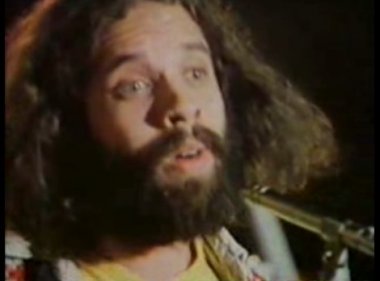
'Sometimes'
it's not enough to pen a major hit October
13, 2007
Dan Hill is seldom surprised these days when "Sometimes When
We Touch'' surfaces in the least likeliest of places.
"One day, I'll be jogging on a treadmill
and a commercial will blast out of the TV with my song on it,''
says the veteran Canadian balladeer of his 1977 smash, ..."It
does create a sort of a morbid feeling that it's no longer mine.''
Hill's soft, unassuming voice takes on
a melancholy...tone upon revealing that during his hungry years
he signed away copyright control of what would become "one
of the most performed songs of all time.'
But who would have known what was originally
penned by a lovestruck teen, primarily to impress a female interest,
would emerge as a soft rock anthem, ...
|
"When
I was 18 and signed away my publishing -- because what did I
know? -- one of the things I signed away was the rights for
them to use (`Sometimes')
in any commercial
they saw fit,
...It's something a lot of us do when we're younger because
we don't really understand
the business ramifications. No one knew back then
that a song could,
I don't know,
change a life.''
"Sometimes When We Touch,''
the hit version co-penned with legendary writer Barry Mann ("You've
Lost That Lovin' Feeling,'' "On Broadway'')...
"I realized my greatest
gift was in being creative and not necessarily being a performer
. . ."
"When you're young, I think it's natural to want to be
the centre of attention . . . to be onstage, to be noticed,''
said Hill, who, as a shy teen, lugged his guitar to parties
to "break the ice.''
|
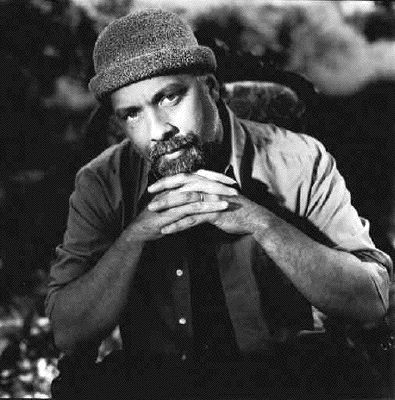
"But as I got older,
I started to realize there were certain things about being
a pop singer I didn't really like that much. There's an awful
lot of lobbying, a lot of things you have to do that aren't
creative just to try to stay on top.
"Whereas, if you try
to be more a person behind the scenes, say as a producer or
songwriter, you don't have to worry so much about living up
to a certain type of fashion standard.''
|
p. 46-47

p. 47
*****
The boys asked to sleep both - in the cabin of Jonathan and
left into the direction of the northern slope of the lower brook.
The path - lit by sensor lamps - will bring them there within
5 minutes.
|
The three grownups
and Elah, on the other hand, invaded the night eastward. Their
eyes got quickly used to the darkness. The path which climbs up
and down to "Petakh-Einayim" was broad and well marked
by outstanding stone sculptures, some of them simple ones like
the rujums, which the desert people erected for thousand of years
as human marks in the open space, and partly wonderful artworks,
a kind of living exhibition integrated in nature. Artists and
pupils of artists and many other fans of beauty use to walk on
the pathes between the
Succayahs and the Midbarons, and a rujum here and a pretty
stone there render inspiration to a simple or a sophisticated
creation. No rules, no limitations, no limit to the erection of
sculptures along the pathes.
It's true, if somebody hopes that he can thus immortalize himself,
it would be better that he wouldn't try to do so in the desert.
He'll have to learn to cope with his disappointment as now Elah
had to do:
"Oh, look!" she stopped and crouched next to a heap
of stones: "I erected such a beautiful rujum here, like the
flower of a lotus from colorful stones".... |
As to the
continuation and the last page of "Altneuland 2003"
-
see November 15
|
See tomorrow - about the
3 fantastic movies - a loop in the educational Channel 23 -
which I was led to open only at 19:35, but managed to see all of them
except the beginning of the first one,
which I have on a German DVD, a gift from Barbara,
after a strong recommendation by Yanina,
in 2005-6
The Story of
the Weeping Camel [in the language of the Mongols]
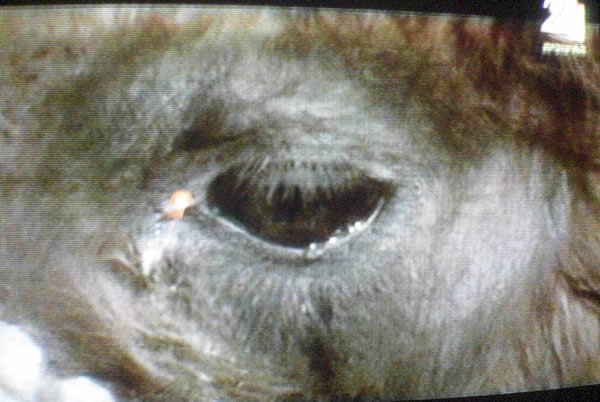
Le Chiavi Di Casa (Keys
to the House) [in Italian]
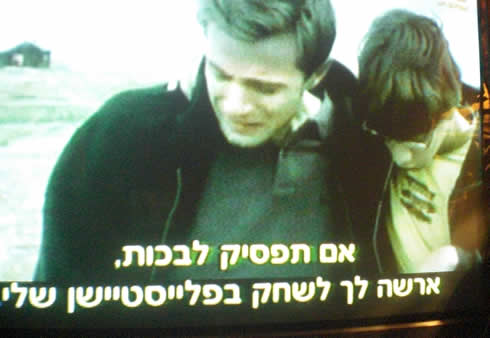 We create our own drama and choose our
actors.
We create our own drama and choose our
actors.
This movie is a magnificent demonstration of this.
His handicapped son is his great teacher.
And when he has driven him "over the edge",
finally triggering the denied aspect of him into tears,
his teacher, his son, is there to comfort him:
"If you stop crying, I'll
let you play with my playstation"
"Don't cry. I am here with you."
|
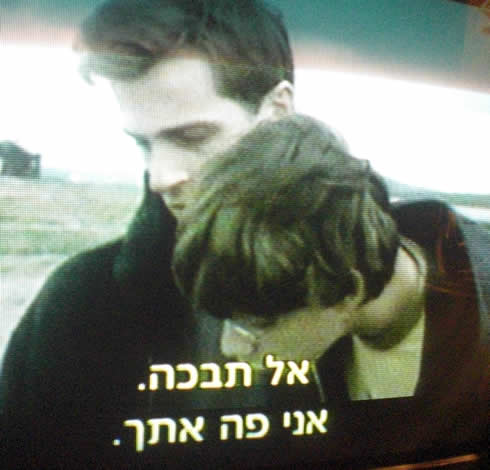 |
Not Afraid, Not Afraid [in British English]
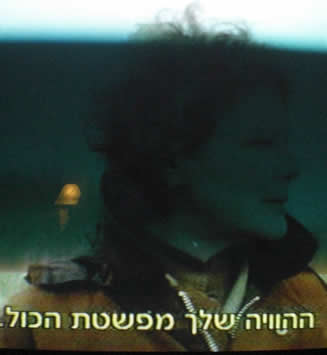 |
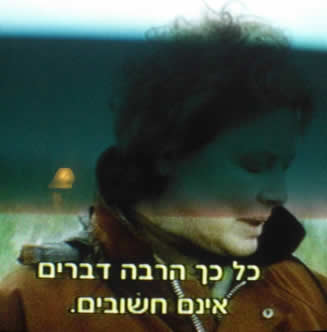 "Your experience simplifies everything"
"Your experience simplifies everything"
"So many things are not important"
"One stays with the gist of things"
"Give me a hug" |
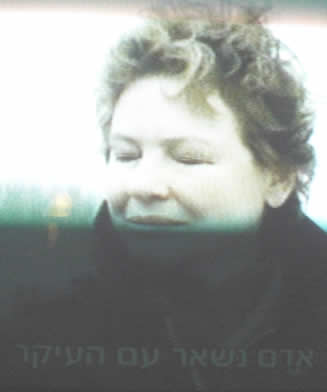 |
|
|
|
|
|
Actions:
To the pool
(2) climbing up and down
the Wadi of Compassion
Garden: working watering
Kisslog: healing-creating
TV & Internet: learning
Preparing food. |
Interactions:
SMS
to Efrat +thanks from her

e-mail to Amir, who still wants to interview me for his Bir'am-Bar'am
history |
|
Intro
to
k.i.s.s.-l o g + all
dates
~ Library of
7 years ~ HOME
~ contact ~
SEARCH
( of Latin characters only!) my
eldest granddaughter's video-gallery
whole&full-filled,
never perfect&complete 
Keep It
Simple Sweetheart
K.I.S.S.
- L O G 2
0 0 8
|


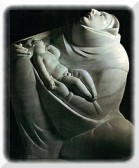
 2004
2004







